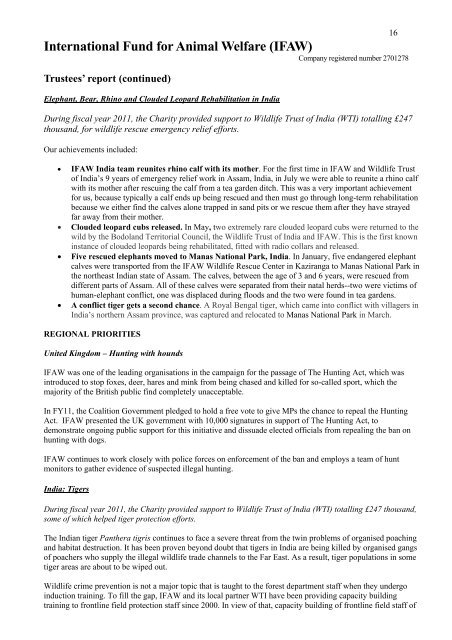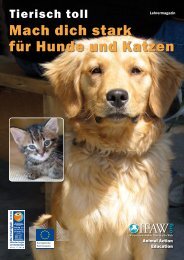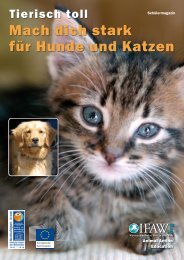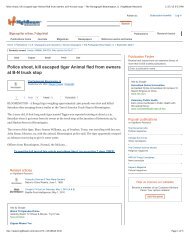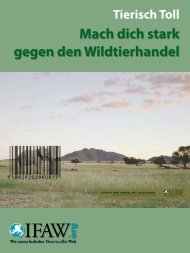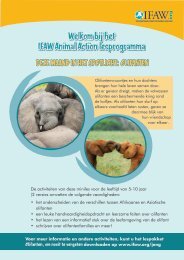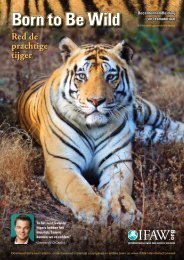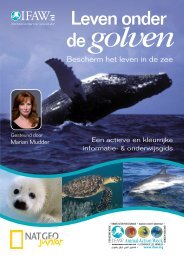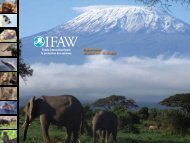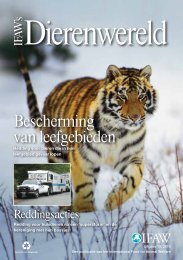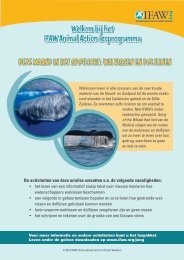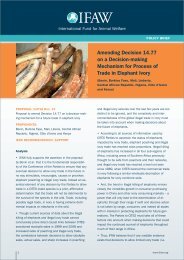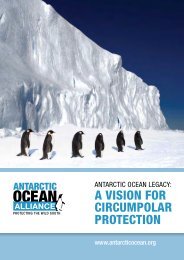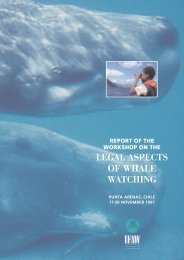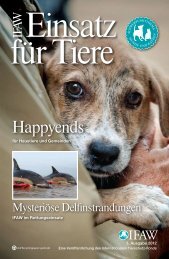ifaw-united-kingdom-charity-financial-statements-2010-2011
ifaw-united-kingdom-charity-financial-statements-2010-2011
ifaw-united-kingdom-charity-financial-statements-2010-2011
- TAGS
- www.ifaw.org
You also want an ePaper? Increase the reach of your titles
YUMPU automatically turns print PDFs into web optimized ePapers that Google loves.
16<br />
International Fund for Animal Welfare (IFAW)<br />
Company registered number 2701278<br />
Trustees’ report (continued)<br />
Elephant, Bear, Rhino and Clouded Leopard Rehabilitation in India<br />
During fiscal year <strong>2011</strong>, the Charity provided support to Wildlife Trust of India (WTI) totalling £247<br />
thousand, for wildlife rescue emergency relief efforts.<br />
Our achievements included:<br />
• IFAW India team reunites rhino calf with its mother. For the first time in IFAW and Wildlife Trust<br />
of India’s 9 years of emergency relief work in Assam, India, in July we were able to reunite a rhino calf<br />
with its mother after rescuing the calf from a tea garden ditch. This was a very important achievement<br />
for us, because typically a calf ends up being rescued and then must go through long-term rehabilitation<br />
because we either find the calves alone trapped in sand pits or we rescue them after they have strayed<br />
far away from their mother.<br />
• Clouded leopard cubs released. In May, two extremely rare clouded leopard cubs were returned to the<br />
wild by the Bodoland Territorial Council, the Wildlife Trust of India and IFAW. This is the first known<br />
instance of clouded leopards being rehabilitated, fitted with radio collars and released.<br />
• Five rescued elephants moved to Manas National Park, India. In January, five endangered elephant<br />
calves were transported from the IFAW Wildlife Rescue Center in Kaziranga to Manas National Park in<br />
the northeast Indian state of Assam. The calves, between the age of 3 and 6 years, were rescued from<br />
different parts of Assam. All of these calves were separated from their natal herds--two were victims of<br />
human-elephant conflict, one was displaced during floods and the two were found in tea gardens.<br />
• A conflict tiger gets a second chance. A Royal Bengal tiger, which came into conflict with villagers in<br />
India’s northern Assam province, was captured and relocated to Manas National Park in March.<br />
REGIONAL PRIORITIES<br />
United Kingdom – Hunting with hounds<br />
IFAW was one of the leading organisations in the campaign for the passage of The Hunting Act, which was<br />
introduced to stop foxes, deer, hares and mink from being chased and killed for so-called sport, which the<br />
majority of the British public find completely unacceptable.<br />
In FY11, the Coalition Government pledged to hold a free vote to give MPs the chance to repeal the Hunting<br />
Act. IFAW presented the UK government with 10,000 signatures in support of The Hunting Act, to<br />
demonstrate ongoing public support for this initiative and dissuade elected officials from repealing the ban on<br />
hunting with dogs.<br />
IFAW continues to work closely with police forces on enforcement of the ban and employs a team of hunt<br />
monitors to gather evidence of suspected illegal hunting.<br />
India: Tigers<br />
During fiscal year <strong>2011</strong>, the Charity provided support to Wildlife Trust of India (WTI) totalling £247 thousand,<br />
some of which helped tiger protection efforts.<br />
The Indian tiger Panthera tigris continues to face a severe threat from the twin problems of organised poaching<br />
and habitat destruction. It has been proven beyond doubt that tigers in India are being killed by organised gangs<br />
of poachers who supply the illegal wildlife trade channels to the Far East. As a result, tiger populations in some<br />
tiger areas are about to be wiped out.<br />
Wildlife crime prevention is not a major topic that is taught to the forest department staff when they undergo<br />
induction training. To fill the gap, IFAW and its local partner WTI have been providing capacity building<br />
training to frontline field protection staff since 2000. In view of that, capacity building of frontline field staff of


